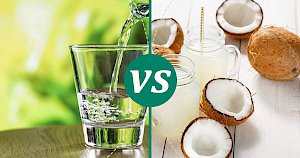Coconut Water vs Water: Nutrition, Calories & Protein Compared


Coconut water vs Water
Nutrition Facts
Serving size:
change
5g10g15g20g30g40g50g60g80g100g120g140g160g180g200g220g250g300g350g400g450g500g600g700g800g900g1000g
1oz2oz3oz4oz5oz6oz7oz8oz10oz12oz15oz20oz25oz30oz35oz40oz50oz
Amount Per Serving:
Serving size:
change
5g10g15g20g30g40g50g60g80g100g120g140g160g180g200g220g250g300g350g400g450g500g600g700g800g900g1000g
1oz2oz3oz4oz5oz6oz7oz8oz10oz12oz15oz20oz25oz30oz35oz40oz50oz
Amount Per Serving:
Coconut Water vs Water 100g Compare
| per 100g | Coconut water | Water |
|---|---|---|
| Water | 94.99 g | 99.9 g |
| Calcium | 24 mg | 3 mg |
| Magnessium | 25 mg | 1 mg |
| Sodium | 105 mg | 5 mg |
| Zink | 3 mg | 0.01 mg |
The Refreshing Tale of Coconut Water vs. Plain Water
In a world where hydration is key to health, the choices for quenching our thirst seem endless. Among the myriad of options, coconut water and plain water stand out for their unique benefits and natural purity. While plain water has been the go-to for hydration for millennia, coconut water has surged in popularity as a trendy and healthful alternative. But beyond their basic ability to hydrate, how do these two beverages compare?
Coconut Water: Nature's Sports Drink
Often hailed as nature's sports drink, coconut water is the clear liquid found inside green, young coconuts. It's not only refreshing but packed with a variety of nutrients and minerals. Coconut water is low in calories, with just 19 calories per 100ml, and contains a mix of carbs, fiber, and a little protein. It's also rich in potassium, magnesium, sodium, and calcium, making it an excellent choice for replenishing lost electrolytes during physical activity.
Moreover, coconut water is more than just a tasty beverage; it's a source of antioxidants and bioactive enzymes that can contribute to better health and wellness. Its relatively low sugar content, compared to many sports drinks, makes it a healthier choice for staying hydrated.
The Universality of Plain Water
Plain water, on the other hand, is the essence of simplicity and the most natural way to hydrate. With zero calories, no sugars, and no fats, it's the ultimate drink for maintaining health without any added concerns about weight gain or sugar intake. Water is crucial for every cell in the body, supporting digestion, absorption, circulation, and even excretion.
While it doesn't contain the electrolytes found in coconut water, plain water is unmatched in its ability to quench thirst and maintain bodily functions. It's also universally accessible and can be consumed in large quantities without worrying about calorie or sugar intake.
Nutritional Comparison
When it comes to nutritional content, coconut water offers more than plain water. It contains vitamins and minerals essential for the body, such as vitamin C, magnesium, and potassium. These nutrients play vital roles in everything from muscle function to immune system support. However, it's also higher in calories and sugars, which might be a consideration for those closely monitoring their intake.
Plain water, with its lack of calories, sugars, and fats, might not provide the electrolytes and nutrients of coconut water, but it's essential for overall health and can be consumed in larger quantities without any dietary concerns.
Choosing What's Best for You
Deciding between coconut water and plain water ultimately depends on your needs and preferences. If you're looking for a beverage to support an active lifestyle, particularly after intense workouts, coconut water could be the more beneficial choice. Its electrolyte content and natural sugars can help replenish the body more effectively than plain water.
However, for everyday hydration, plain water is unbeatable. It's essential for life, calorie-free, and the best way to stay hydrated without any added sugars or calories. Plus, it's the most cost-effective option for maintaining daily hydration.
In conclusion, both coconut water and plain water have their unique advantages. Whether you choose the nutrient-rich profile of coconut water or the simplicity and purity of plain water, staying well-hydrated is key to maintaining good health. So, next time you reach for a drink, consider what your body needs most at that moment and make your choice accordingly.
Coconut water 100g
19kcalCalories source
- 76% CARBS.
- 15% PROTEIN
- 9% FAT
Water 100g
0kcalCalories source
- 0% CARBS
- 0% PROTEIN
- 0% FAT
Compares of coconut water
- Coconut Water vs Coconut Milk
- Coconut Water vs Almond Milk
- Coconut Water vs Coffee
- Coconut Water vs Tea
- Coconut Water vs Oat Milk
- Coconut Water vs Rice Milk
- see all compares of coconut water
Compares of water
Read also:
- Calories from Coconut water
- Calories of Pork neck
- Calories in Tabbouleh
- McFlurry McDonald's calories per 100g
- Kolache protein per 100g
- How many calories does injera have?
- Calories in a half of brandy
- Calories in whole brandy
- Calories for one, two or more brandy
- Calories in glass of brandy
- Calories in cup of brandy
- Calories in shot (small glass) of brandy
- How much protein in salmon patty?
Marcin Piotrowicz
calories-info.com creator
Healthy diet and healthy lifestyle promoter
Add comment